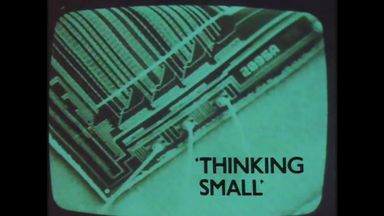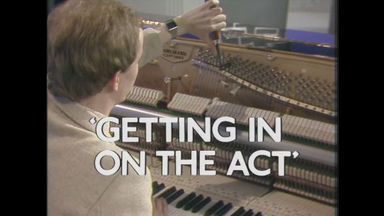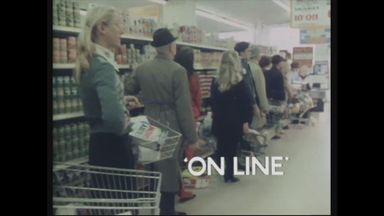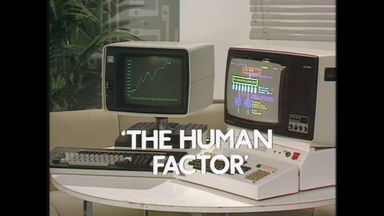Managing the Micro
1. Thinking Small
BRIAN REDHEAD examines some of the implications of the new technological revolution for people in industry today. 1: Thinking Small : Software control is said to be the key to the importance of the micro. But what does that mean? And how is microelectronics helping small companies to stay competitive at a difficult time?
Film editor M. A. C. ADAMS Producer DAVID ALLEN
Clips from this programme
Opening titles by Haydon Young, with music by Roger Limb, BBC Radiophonic workshop
Duration: 00:34Brian Redhead sets the scene for the series: new microprocessor based technology brings opportunities and threats to management and the workforce. A wood grading machine in Lancashire is a good - if unusual - example, speeding up the checking of quality in a yard making roof trusses.
Duration: 03:17How a computer controlled system works: input sensors send information to a central processor which executes a series of instructions coming from a software program held in its memory. It then drives output devices. Crucially, what happens can be changed by changing the program. Brian Redhead explores 'software flexibility' with Geoff Vincent, senior engineer at Texas Inustriments UK, using a model programmable conveyor system.
Duration: 05:11After initial scepticism a company running a paper mill in Lancashire has bolted on a new computer control system with great improvements in quality, energy saving and efficiency.
Duration: 02:14In a knicker factory in Macclesfield - Brian Redhead's home town - he shows how a simple home designed programmable device has rapidly improved productivity and also wages. Jan Stewart of the government's MAP (Microelectronics Advisory Programme) explains the help available to small companies.
Duration: 04:41A domestic lighting control system is one example of a new computer-controlled product. As companies face competition, keeping abreast of fast technological change and providing advice to them is proving difficult because of management inertia or fear.
Duration: 02:27How a problem faced by a small engineering company making screw-threaded rods might be helped with advice by the government MAP scheme
Duration: 05:33Managing the Micro
1. Thinking Small
First broadcast: 17th May 1981
Duration 24:46
BRIAN REDHEAD examines some of the implications of the new technological revolution for people in industry today. 1: Thinking Small: 'Software control' is said to be the key to the importance of 'the micro'. But what does that mean? And how is microelectronics helping small companies to stay competitive at a difficult time? Film editor M. A. C. ADAMS Producer DAVID ALLEN
Now playing
2. Getting in on the Act
First broadcast: 24th May 1981
Duration 24:23
BRIAN REDHEAD examines some of the implications of the new technological revolution in industry. 2:Getting in on the Act: It is said that companies must 'think micro' because if they don't others will. But how can a micro be introduced into a new product? And how much risk is there? An electronic piano tuner, a greenhouse controller, a tape measure and a digital read-out for machine tools help show what is involved. Film editor U. A. C. ADAMS Producer DAVID ALLEN
3. Towards the Last Frontier
First broadcast: 31st May 1981
Duration 24:35
BRIAN REDHEAD examines some of the implications of the new technological revolution for people in industry today.3: Towards the Last Frontier: Britain's industrial survival may depend on the readiness of companies to adopt flexible, computer-based manfacturing methods. But flexibility is not just a matter of equipment. It's also a question of attitudes and the ability to come to terms with the human effects of change. Director: DAVID SCOTT COWAN Producer: DAVID ALLEN
4. On Line
First broadcast: 7th June 1981
Duration 24:30
BRIAN REDHEAD examines some of the implications of the new technological revolution for people in industry today. 4: On Line: Laser supermarket check-outs, new time clocks at British Leyland, and Viewdata terminals in the local garage are only the tips of a number of electronic icebergs-networks of information links which are beginning, for good or ill, to have a far-reaching effect on the high street and on white-collar jobs in industry. Director DAVID SCOTT COWAN Producer DAVID ALLEN
5. The Human Factor
First broadcast: 14th June 1981
Duration 24:27
BRIAN REDHEAD examines some of the implications of the new technological revolution. 5: The Human Factor: The office is ripe for major changes and there have already been disputes over the introduction of new equipment such as word processors. How do people react to the micro? Is the spread of the new technology inevitable? Director DAVID SCOTT COWAN Producer DAVID ALLEN












